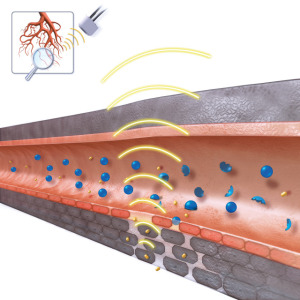Philips hopes ultrasound unlocks potential of gene therapy
by
Brendon Nafziger, DOTmed News Associate Editor | June 17, 2010

Ultrasound mediated
drug delivery
(Image courtesy of Philips)
An experimental therapy that offers hope for treating disease by shutting off targeted genes might work if controlled with ultrasound pulses, according to Philips Healthcare.
Last week, Andover, Mass-based Philips inked a deal with biomed company RXi Pharmaceuticals to research using ultrasound to activate the therapy, known as RNA interference, or RNAi, which could help block genes implicated in several diseases.
The agreement is part of Philips' effort to move beyond diagnosis to therapy planning and image-guided intervention, the company told DOTmed News.
"Our decision to jointly research RNAi-based therapies with RXi is driven by our belief that patient care will ultimately benefit from the combination of novel drugs and advanced medical imaging technologies," Henk van Houten, senior vice president of Philips Research and head of its health care research program, said in a statement.
RNA is a chemical messenger used by DNA to carry out its commands, such as building proteins. In RNA interference, snippets of double-stranded RNA break off and attach to other strands of messenger RNA, stopping them in their tracks and effectively blocking the effects of the genes whose bidding they're doing.
The therapeutic promise of the technique is great since the goal is to shut off genes implicated in diseases such as cancers, Dr. Craig Mello, a professor at University of Massachusetts Medical School in Worcester and a founder of Worcester-based RXi, told DOTmed News.
Mello shared the Nobel Prize in Physiology and Medicine in 2006 with Andrew Z. Fire of Stanford University for his discovery of RNA interference.
"The numbers of possible products are [only] limited by the number of genes there are in the human," he said. RNAi can be developed to knock down genes involved in inflammation, cancer, and neurodegenerative disorders, Mello observed.
However, there is a massive obstacle to bringing the therapy into the clinic: making sure the therapeutic drugs go where they're supposed to go, and nowhere else.
"You have to get this into the cell for it to work," Mello said.
If injected, drugs relying on RNAi could deactivate genes throughout the body, and not just at the targeted site such as a tumor.
"So, the challenge for the whole field is delivery," Mello said, "and what Philips brings to this is technology for delivering and releasing drugs in a very precise region."
What Philips and RXI plan to do is research using ultrasound to ensure the drugs get activated only where they're supposed to.
